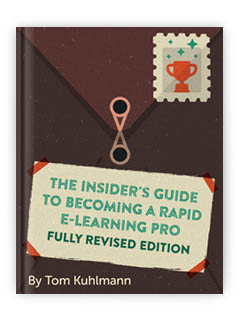I had an SME who frequently travels and was not interested in meeting or discussing this at any length, yet he had the expertise. I researched the topic online, then provided him 20 questions which reflected the key information we needed. These were ordered. I formatted a template, dropped his responses in, edited down…and voila!
How to Get The Most Out Of Your Subject Matter Experts
July 5th, 2007In previous posts, we explored understanding the customer’s perspective, how to jump start you project, what you should know about designing a course, and how to build a project plan. Today, we’ll take a look at working with subject matter experts.
Subject matter experts (SME) play a key role in the development of your e-learning courses. They help you craft the learning objectives, create content, review it for accuracy, and provide valuable feedback.
At a recent e-learning conference I attended, the participants were asked what some of the biggest challenges were to developing their courses. Well over half said that working with SME was a challenge and many times interfered with getting the projects done on time.
Today, we’ll look at some tips to help you manage the relationship with your project’s subject matter experts.
On a Clear Day You Can See Forever
Clear communication is central to your project success. What we say and what we mean are not always the same. To complicate matters, what people hear us say, is not always what we want them to hear.
It is important to establish clear objectives and expectations when working with others, especially SME who are rarely trained instructional designers.
Bring them in on the projects early. Stay on top of project milestones and make sure you are proactive in communicating with the SME. Be sensitive to their workloads. If you expect some feedback from the SME, make sure you explain what you need and when you need it.
The “S” Stands for Subject…Not Slave
Everyone is busy. Do not abuse the time you have with the SME. Prepare for your meetings and information gathering. Collect as much information as you can prior to meeting with your SME. This helps you build a context for the e-learning course. It also helps you understand the subject matter expert’s world. And it shows the SME that you are interested in the subject and what he has to offer.
Provide a Quick Overview of How People Learn
People have preconceived ideas about training and learning. Don’t assume that when you start talking about e-learning that the SME understands what you mean. It is a good idea to develop a quick elevator pitch about learning and how you’d like to see the course work.
This gives the SME some additional information and context for the project goals. It also allows them to brainstorm ideas on how to create a meaningful learning environment using what they know.
The key is to do this quickly. Don’t bore them with long lectures on learning theory. The idea is to help them know what you need to do with their expertise to create a good learning environment.
There’s a Reason You Have Two Ears & One Mouth
Be a good listener and learn from your SME. Active listening is a sign of respect. If your SME knows that you are genuinely interested in her input, you’ll win an ally.
Ask good questions. After using your two ears, make sure you use your one mouth to ask the right questions. The SME time is valuable. Thinking through the right questions will help you make the most of it. Come prepared with a list of questions. You cannot go wrong with the standard “Who, what, where, when, and why?”
Keep the Subject Matter Expert in the Real World
You want to capture the SME experience and balance it with the world of the novice. SME are experts and typically model the course outcome. However, their expertise can hinder designing the best e-learning environment since it can be complicated for new learners.
Sometimes less is more. Try to keep the SME in the real world. To help drill down to the essential information, give them strict parameters. For example, “if you only had three screens to share your expertise, what would those three screens contain?”
Another way to keep the SME in the real world is to balance their expertise with the input of a recent or new learner.
Use a Simple Template to Help the Subject Matter Expert
If you find that you have limited access to the SME, then it’s a good idea to create a template for them. Use a basic training outline that covers the core objectives and asks questions that helps them share their expertise. Also ask how a new learner can practice using the information in the course and in the real work environment.
Show Them Love
People like to be encouraged and affirmed. Here’s a tip that has always worked for me. As a habit, I try to give good feedback to the people I work with. In addition, I will drop a quick email to their managers extolling the value of the SME input and how it is greatly appreciated and a service to the organization.
This not only serves you well on the project, it will pay dividends later if you need more of their time.
Subject matter experts have valuable insight and you need it.
A large part of your e-learning course’s success depends on the relationship you have with your subject matter experts. The actions you take show them that you value them and what they have to offer. The better relationship you have with them, the better success you’ll have.
What are some of the things you do to get the most of out of your subject matter experts?
Our next post will look at multimedia and what you need to know.
Events
- Everyday. Check out the weekly training webinars to learn more about Rise, Storyline, and instructional design.
Free E-Learning Resources
 |
 |
 |
|
Want to learn more? Check out these articles and free resources in the community. |
Here’s a great job board for e-learning, instructional design, and training jobs |
Participate in the weekly e-learning challenges to sharpen your skills |
 |
 |
 |
|
Get your free PowerPoint templates and free graphics & stock images. |
Lots of cool e-learning examples to check out and find inspiration. |
Getting Started? This e-learning 101 series and the free e-books will help. |
22 responses to “How to Get The Most Out Of Your Subject Matter Experts”
I’m very interested about the method presented by Jennifer.
I provide SME a set of questions during the start-up step, when it’s necessary to find out the objectives.
Since the objectives are clear, I follow this path to submit to SME the content which will be used for the e-learning course:
1. I collect various materials about the matter (paper or digital versions) and study the subject;
2. I prepare a sort of Information Mapping® that I call “Content Map”. In the CM the content is chunked and each title of every single chunk could be a title for a future argument in the course.
3. I send the CM for supervision by the SME.
Are you asking the SME’s to send in related materials…and then creating the Content Map for them? Do you create the learning objectives, yourself? If so, that’s also an interesting approach.
Our SME’s are all outside my organization/member companies to our professional association, so they are selective of what information they will share. I need to do extensive pre-writing research on critical issues related to the topic (internet, journals, colleagues, etc.). Then, I prepare a What, How, Why, & When Appropriate survey. This helps me create or revise learning objectives. I begin formulating the PPT for online(structuring it helps me find gaps in information or useful aids needed), and I ask another expert in the field to point out “gaps” or critical points that need expansion.
I’m limited in how much I can communicate with our members/learners. SO, we are formulating a committee of industry reps to help us become more focused in our learning objectives. I’m also trying to get permission to use our eDiscussion listserv to do some (informal) research.
The answer to your questions is “yes” for both, but with a clarification about the objectives creation. In this case, I necessarily have to consider my future learners’ formative needs, that are at first (and often not so clearly) outlined by our “internal customer” ( i.e. for example an area manager). To gain this result I ask a set of questions about what is the knowledge or performance gap to fill up. After I collected these suggestions, I write a document in which I try to list few “macro-objectives” for the whole course. Then, I identify the most appropriate learning strategies to present the content. For example: lesson to explain the product features; sale simulation to make the learner try to sell the product to a virtual customer, etc. Finally, going deep in detail, I define objectives for each one of the Learning Objects that will be developed. We use this kind of classification (LO) for different elements of a course: lessons, simulations, role playing, and so on. As you can see, the SME (in our company is an internal member) is involved in this process only to help the ID to manage the content, but not to design the course.
Great idea, Tom! I think wiki is a really good tool to share and enhance knowledge. However, we can’t rely on SMEs to fill it because they are too busy. Last month I presented to my boss an idea that one day I hope will become a project, about the creation of a Virtual Library for the entire Group (something like MERLOT that could be connected to the LMS). A digital library in which people can easily find whatever they need for their job, because containing the enormous quantity of information (explicit and implicit) grown during the years. It could be a good knowledge management solution, but it also mean that a team should work for to make the whole content suitable for it (i.e. in a right format) in order to be indexed. But, obviously, a project like this needs a lot of resources…
I work with lots of chemists and mostly english is 2nd language for them. I have to pay attention and listen carefully in order to get clarification for each step while I am writing and editing the standard operating procedures. I try to be clear, concise, and use simple phrases to make the material easy to read and understand.
the concept are very clear .I understand it and i take the place of my student .See what they cant or dont understand in my presentacion.If I dont understand the concept I try to have more clip art in it and make more ejem of the concept by asking . This has to be a teacher way of seening the concept and the students.I have to have body way of expresing the concept. Thank you
[…] How to Get The Most Out Of Your Subject Matter Experts […]
I you, Tom! Thanks for all your great tips and advice!
Tom,
Great Blog! I found this to be a very useful subject.
I have written a small checklist of the key points to review right before i speak to a SME.
Hope to be able to put it into practice in the coming weeks
Thanks Scott
Hello Tom,
I’m new to your site and in UK. It’s a great resource and i will be visiting often for tips. We are a global elarning company with many automotive clients. Your ideas on structure and interaction are very useful.
Keep up the great work! cheers..
[…] How to Get the Most Out of Your Subject Matter Experts This article focuses on e-learning but seems quite relevant to all situations with SMEs […]
[…] […]
[…] for this post also came from: the Articulate blog; from Clark Aldrich’s blog, which specially deals with immersive learning simulation and game […]
Thanks for the confirmation. I tailor all these things to my SMEs and I am and have been very successful working with them.
[…] […]
[…] 5 clés de succès pour réussir avec brio vos prochains parcours de formations en ligne How to Get The Most Out Of Your Subject Matter Experts In previous posts, we explored understanding the customer’s perspective, how to jump start you […]
Wow! At last I got a weblog from where I can
really get helpful information concerning my study and knowledge.
I think this is one of the most important info for me. And i am
glad reading your article. But want to remark on some general things, The web
site style is perfect, the articles is really great :
D. Good job, cheers










0
comments